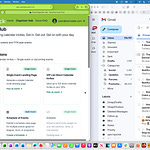What is the primary purpose of the "Stage Attendees for Cancelled Event" function within the Calendar Invite Server (CIS)?
The "Stage Attendees for Cancelled Event" function is designed to efficiently identify all individuals who were invited to a cancelled event and then queue up cancellation notifications for them. Its main goal is to ensure that every attendee receives a proper and automated notification about the event's cancellation, maintaining clear communication and organization.
Which AWS services are critical to the operation of the "Stage Attendees for Cancelled Event" function?
The function heavily relies on several AWS services to achieve its purpose:
AWS Lambda: This serverless compute service is responsible for handling the actual staging of event attendees.
Amazon SQS (Simple Queue Service): SQS is used to manage and queue event cancellation requests, ensuring reliable message delivery.
Amazon DynamoDB: This NoSQL database service is crucial for retrieving and storing attendee records associated with a specific event.
Amazon SNS (Simple Notification Service): SNS is used to publish actual cancellation notifications to attendees.
How does the event processing flow work when an event is cancelled?
The process begins with a trigger: an SQS event notification signals that an event has been canceled. Following this, the function queries DynamoDB to get a comprehensive list of all attendees for that specific cancelled event. Once the attendee details are retrieved, they are formatted for cancellation, and cancellation requests are published to SNS. Finally, to prevent redundant processing, successfully handled messages are deleted from SQS.
What are the main key functions involved in staging attendees for a cancelled event?
Several key functions work in concert:
lambda_handler(event, *): This function iterates through each record received from the SQS event.
process_request_from(record): This function extracts cancellation details, queries DynamoDB for attendee records, queues cancellations for all affected attendees, and deletes the processed SQS message.
get_attendee_list(uid): This function is solely responsible for querying DynamoDB to retrieve all attendees for the cancelled event based on its unique identifier (UID).
queue_cancellation_for_processing(event, attendees): This function publishes an SNS message for each attendee, effectively notifying them of the cancellation.
delete_successfully_processed_sqs(message): This function removes messages from SQS after they have been successfully processed, preventing them from being retried.
How are attendee records structured in DynamoDB for this function?
Attendee records in DynamoDB are designed with a specific key structure to enable efficient retrieval:
pk: This serves as the partition key, identified as event#.
sk: This acts as the sort key, identified as attendee#. This structure enables the practical storage of attendee information and their participation status related to a specific event.
What environmental variables are used by the "Stage Attendees for Cancelled Event" function?
The function relies on several environmental variables for its configuration and operation:
REGION: Specifies the AWS Region where the function executes.
DYNAMODB_TABLE: Defines the name of the DynamoDB table used to store attendee records.
SQS_URL: Provides the URL of the SQS queue responsible for processing event cancellations.
EVENT_CANCELLATION_REQUEST: Specifies the Amazon Resource Name (ARN) of the SNS topic used for publishing cancellation notifications.
How does the system handle errors that may occur during the cancellation process?
The system incorporates several error-handling mechanisms to ensure robustness:
Missing Attendee Records: If no attendees are found for a cancelled event, the system logs this issue and exits gracefully, rather than attempting to process non-existent data.
SNS Publishing Failures: While these failures are logged for troubleshooting purposes, they do not halt the overall execution of the function, allowing other notifications to proceed.
Exception Logging: A general mechanism is in place to log all errors, which significantly aids in debugging and identifying root causes of issues.
Beyond the "Stage Attendees for Cancelled Event" function, what other related functionalities are part of the Calendar Invite Server (CIS)?
The provided source indicates that the Calendar Invite Server (CIS) is a comprehensive system with many functionalities. While specific details for all are not available, the table of contents suggests other key areas like:
Sending bulk event invites and individual invites.
Notifying organizers of successful/failed event creation, enrollment, or event limits being reached.
Processing new event requests and replies from email or API.
Managing event updates and getting various reports (attendee, system events, organizer events).
Handling event management, creating new event records, and sending event updates/cancellations.
Pre-built notification email templates and even processing Shopify orders are also mentioned, indicating a broad scope for the CIS.












